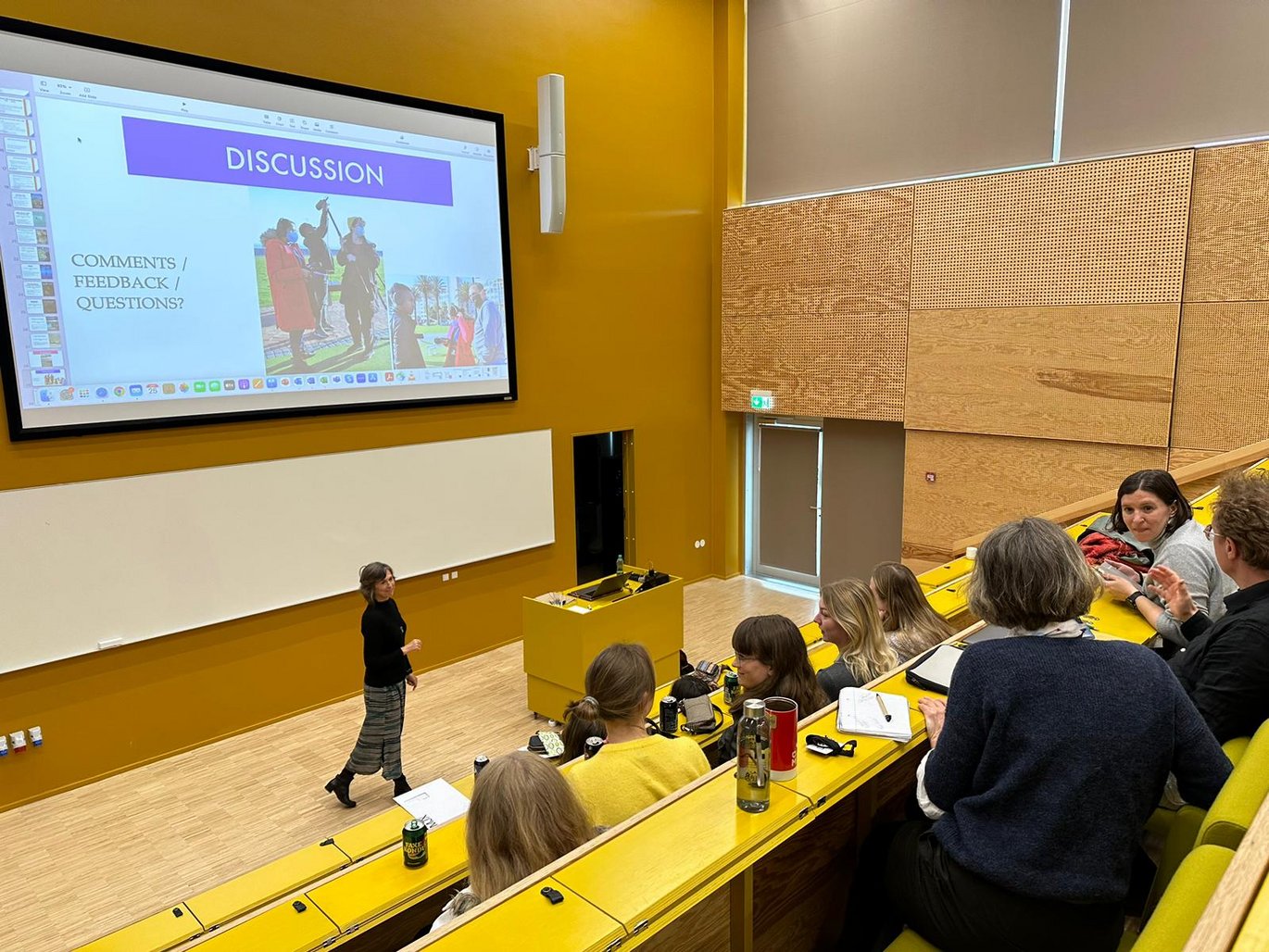Dr Julia Cain’s visits to Charles University and DMJX + Aarhus University
Where to start with reporting upon such rich and enjoyable exchanges with wonderful new colleagues in beautiful places? It is a lucky challenge to have!

Where to start with reporting upon such rich and enjoyable exchanges with wonderful new colleagues in beautiful places? It is a lucky challenge to have!
My first visit was to Charles University in the enchanting city of Prague. Here I received a warm welcome from the Dean of the Faculty of Social Sciences, Dr Alice Nemcova Tejkalova, and Mgr. Frantisek Gela from the Institute of Communication Studies and Journalism. Frantisek generously helped shepherd me around during much of my stay, providing my initial tour and discussion of the Institute’s facilities as we both work in practical video teaching.
Mgr. Sandra Labova, the Erasmus Mundus Journalism Coordinator, had arranged for me to give a lecture in Prof. Martin Stoll’s course during which I was able to share a perspective on the Centre for Film & Media Studies at the University of Cape Town with a focus on the documentary production our honours students are doing. Part of this session included a screening of our SAFTA-winning (national film & television awards) Best Student Film, Water is Water. It was fascinating to hear Czech students draw a connection to their own experiences as a post-communist era generation to the post-apartheid generation depicted in the film.
My other engagements at Charles University included an extended curriculum discussion with a number of colleagues from within the Institute as well as 2 PhD candidates. It was very useful to hear how the various programmes were structured, particularly those that include practical components comparable to the ones with which I am primarily involved at UCT. I also enjoyed speaking with the PhD students about their research, both of which related to media representation of violence and the ethical questions this raises, as documentary ethics is a current research interest of mine.
Post lecture and lunch with colleagues at Charles University
Lastly I had the opportunity to monitor a couple of courses, including a stimulating and interactive media studies class as well as a work-in-progress feedback session with student documentary groups that was similar to the types of approaches we use at UCT.
After a little break, I headed to Aarhus, Denmark to visit both the Danish School of Media and Journalism (DMJX) and Aarhus University. This involved an amusing arrival story -coincidentally meeting one of my next hosts on the bus when Assoc. Prof. Inger Larsen from DMJX recognised me from our Zoom conversation! So I was off to a great start, including a warm welcome by Helle Lyster from DMJX who had visited us in Cape Town just 3 weeks previously.
At DMJX I had the pleasure of working with the international group of undergraduate journalism students working on their documentary projects over the course of the week. This included facilitating an interactive session with them around ideation and artistic voice as well as touching on documentary ethics. I also heard their pitches and joined the production group feedback sessions on their pre-scripts. All of this was absolutely relevant to my own work with documentary filmmaking students and very useful to see the connections and variations on this type of practical teaching along with the work and ideas of the students – for this I am very grateful to Inger.
I also had the opportunity to present an open lecture under the auspices of the local student DOX club, facilitated by Helle. This presentation, “Owning the narrative,” focused on the types of stories South African students are choosing to tell and how. Much of this was drawn from the recent case study chapter I have written for the upcoming CILECT book, Teaching and Learning Documentary Cinema for the 21st Century. This session included a really generative discussion thanks to the students and the number of colleagues that attended.
Thanks to Inger Munk from the International Office, my week included a number of curriculum discussions with both DMJX and Aarhus University (AU) colleagues. I had a very useful meeting with Assoc. Prof. Morten Brænder at AU as Vice-head of the Mundus Board of Studies who mapped out the various programmes for me and described the cooperation between DMJX and AU for the Mundus Journalism programme. I later had a great afternoon session with colleagues from both institutions on curriculum that was really stimulating and resulted in a great deal of sharing related to pedagogy and making connections in our shared fields of interest – thanks here to Ass. Prof. Steffen Moestrup, Ass. Prof. Alan O’Leary and Dr Cecilia Olivera.
I would be re-miss in not mentioning the added value of the many other experiences that enriched my travels to both Prague and Aarhus, made even more striking against the backdrop of the pandemic and the relative isolation of the past few years. There was the opportunity to indulge my love of the performing arts in Prague – seeing ballet, opera and physical theatre – as well as wonderful contemporary art and historical museums. In Denmark I enjoyed the thrill of cold water Nordic dips, a ‘higge’ supper gathering at Helle’s house, and the loan of a bicycle by Steffen to experience life like a Dane. All of these are memories to keep for a lifetime.
In closing, I am very grateful to my various hosts at Charles University and DMJX and Aarhus University for their collegiality and for the opportunities to engage around both teaching and research interests. I am also grateful to my home institution, the University of Cape Town, and particularly my department, the Centre for Film & Media Studies, for nominating me to take advantage of this wonderful opportunity.